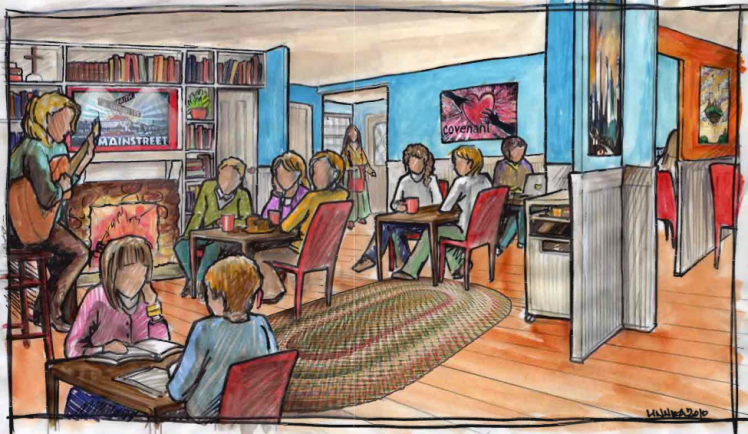The decade of the 2000s featured the explosive popularity and growth of coffee shop chains. College students and working professionals abandoned the library and office, and took their books and laptops to the nearest Caribou, Starbucks or, my favorite, Dunn Bros.
Friends of all ages went to a coffeeshop to catch up and gossip, and somehow we all collectively agreed we would pay $5 for a caffeinated drink. You know you’ve successfully launched a social revolution when even non-coffee drinkers like me are regularly heard saying, “Hey, wanna grab coffee this week?” (Thank God for those bottles of coke they sell.)
In his 1989 book The Great Good Place, Sociologist Ray Oldenburg coined the term “third places” to describe places like coffeeshops where people spend time between home (‘first’ place) and work (‘second’ place). They are locations where we exchange ideas, have a good time, and build relationships.
Like many church planters at the end of the decade (2010), I wanted to capitalize on the coffeeshop craze and third place concept for a more inviting front door into a faith community. Our vision for MainStreet Community (we later caved into pressure and went with the more formal MainStreet Covenant Church) was a coffeeshop style atmosphere in a non-churchy strip mall next door to a pre-school.
The basis for this vision was not an aversion to stained glass and steeples, but rather the compelling missional approach Paul took when trying to reach the pagan culture of ancient Athens. In Acts 17:7-21 we read:
17 So Paul reasoned … in the marketplace (Gk. “agora”) every day with those who happened to be there.18 Some of the Epicurean and Stoic philosophers were conversing with him, and some were asking, “What does this foolish babbler want to say?”…19 So they took Paul and brought him to the Areopagus, saying, “May we know what this new teaching is that you are proclaiming? 20 For you are bringing some surprising things to our ears, so we want to know what they mean.” 21 (All the Athenians and the foreigners who lived there used to spend their time in nothing else than telling or listening to something new.) (Acts 17:18-21)
In 2010 coffeeshops were the places where people gathered to exchange ideas, read the latest gossip, discuss books, and just have a good time and build relationships. In Athens, Paul’s ideas and religious views landed him at a gathering place or assembly called the Areopagus where open-minded spiritual seekers and heavy-hitting intellectuals “used to spend their time in nothing else than telling or listening to the latest ideas” (17:21).
The original vision of MainStreet was to create this kind of a gathering place, and attract these kinds of spiritual seekers, and engage in regular conversations about culture, religion, politics and other meaningful topics through things like a Saturday morning book club, midweek discussion forums, Friday night open mic nights, and so on. All of it would happen around a crackling fire and the sound of laughter and coffee grinding.
I was going to lead the teaching and discussions, and Keri was going to bake the Swedish pastries and run the cafe. We even had a place in town picked out and had conceptual drawings made by an artist friend (see below).

Nearly a decade later, MainStreet community is still gathering and doing life together. God has knit together a grace-filled family of faith, and many lives have been touched by this rag-tag band of spiritual pilgrims. As for the original Acts 17 “in the marketplace daily” vision, that is another story I will go more into next time as we ponder if Paul’s strategic approach in ancient Athens can still be appropriated somehow for fruitful ministry as we enter a new decade. Stay tuned.
Read more in this series called “Jesus on Main Street.”
Discover more from Kingdom Harbor
Subscribe to get the latest posts sent to your email.